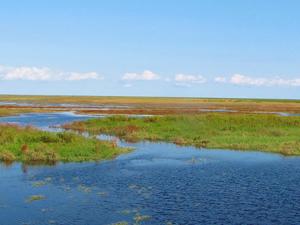New EPA water rules causing waves
The Environmental Protection Agency wants to protect Florida bodies of water like Lake Okeechobee. (Image by Riverbanksoutdoorstore (CC: by-nc-sa))
Story by Manuel Quinones, CNC News
This story is adapted from a broadcast audio segment; use audio player to listen to story in its entirety.
Environmental attorney Ralf Brookes has enjoyed scuba diving in the Florida Keys for the past 20 years. He recalls gin-clear waters and healthy reefs. But Brookes says he’s seen first hand how pollution has jeopardized the area’s beauty.
“The turtle grass is all covered with brown algae and it’s smothering it to death,” Brookes said. “Most of the corals in the patch reef are smothered or are dying or dead. When you get out to the main reef, it’s just tragic, you feel like crying because it’s probably ten percent as good as it used to be.”
Brookes says he’s encouraged by a new plan by the U.S. Environmental Protection Agency to lower phosphorous and nitrogen levels in lakes, rivers, streams and canals.
The agency is getting tough after environmental groups sued back in 2008.
But the proposed EPA action is also causing controversy. It’s the first time the agency seeks to override Florida’s water quality standards, which is setting up an unprecedented showdown between local businesses and Washington bureaucrats. Earthjustice lawyer David Guest says the pollution comes from untreated sewage, cow manure and fertilizer. He says it’s an especially big problem with the Miami-Dade canal systems.
“If you spray liquid fertilizer on your grass, the grass will grow like crazy and it will turn this crazy green color. Well you spray that same fertilizer on the water, which is what happens when it rains, then you get this crazy growth of algae in the water,” Guest said.
Ephraim King, director of the EPA’s Office of Science and Technology, says the pollution caused by population growth is outpacing Florida’s attempts to regulate it.
“While that process probably works well when you only have a few impaired waters, in Florida, they’ve got over 850 waters that are impaired, and 60 percent of those are impaired due to nutrients,” King said.
Fighting back is a coalition of 75 business and utility groups. They’ve formed an organization called “Don’t Tax Florida.”
That list includes peanut and row crop farmers from the Panhandle. Larry Ford has run a farm in Jackson County for 40 years. He’s concerned the new caps would restrict fertilizers that make his fields more productive.
“For instance, say that we’re putting out 180-200 units of nitrogen on corn and they tell us you have to cut back to half that, the impact on yield is going to be dramatic,” Ford said.
Both Florida senators and 18 House members, including Republican Rep. Ileana Ros-Lehtinen and Democrat Rep. Allen Boyd, say the new rules would hurt Florida’s already struggling economy.
Sen. George LeMieux calls them “draconian.”
“We already have a very difficult economy,” LeMieux said in an interview outside the Senate floor. “We don’t need to put up anymore roadblocks that are going to keep people from having jobs. I’m very concerned that this policy would be devastating to the building and construction industry.”
The new rules would require utility companies to reuse all of the wastewater generated in each community, according to Paul Steinbrecher, vice president of an industry coalition that represents utilities and local governments.
“I think the cost factor is important and I do think when the citizens of Florida realize this is going to more than double the average water and sewer bill, they’re going to be interested in that,” Steinbrecher said.
But King says clear Florida waters are good for boaters, scuba divers and the state’s recreation industry.
“We think it’ll make it stronger, and it’ll increase its prosperity,” King said. “And we actually think working with farmers and working with the stakeholders, we’re pretty confident that we’re going to be able to find a path through this.”
Public hearings on the new rules begin Tuesday in Tallahassee. There is another one Thursday in West Palm Beach.
EPA officials must finalize the proposal by October.
Created by Bureau Chief and Executive Producer Melinda Wittstock, Capitol News Connection from PRI provides insightful, localized coverage of participating stations’ congressional delegations.
